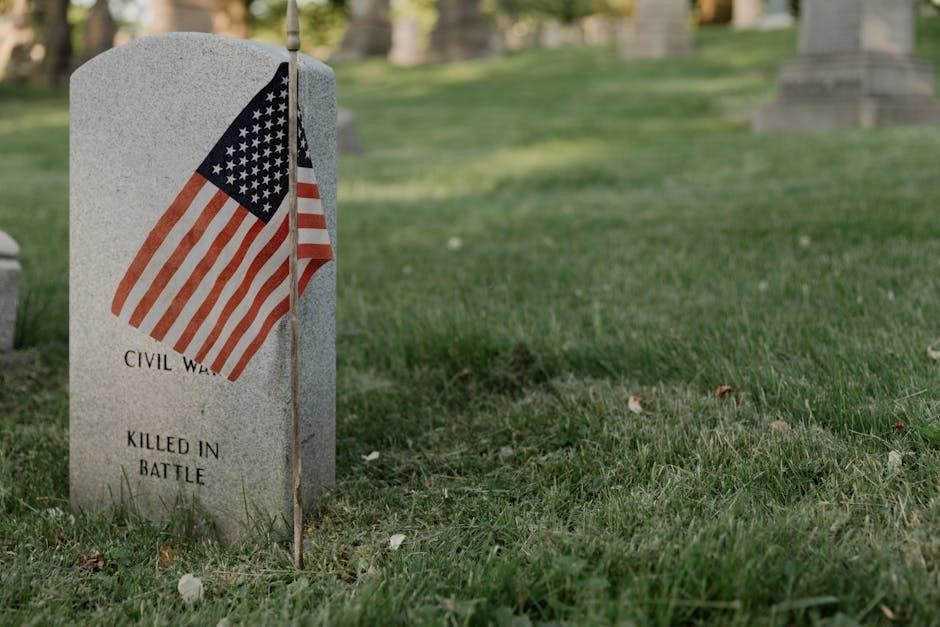The American Civil War (1861–1865) was a pivotal conflict between the Union (North) and Confederacy (South), primarily over slavery and states’ rights. Southern biographies offer deep insights into the lives of key figures like Robert E. Lee and Jefferson Davis, providing a personal perspective on the war’s motivations and consequences. Free PDF downloads of these biographies, such as Robert E. Lee: A Biography and The Confederate War, are widely available online, allowing readers to explore the Southern experience and leadership during this transformative period in American history.
1;1 Historical Context of the Civil War
The American Civil War (1861–1865) was a defining conflict rooted in deep divisions over slavery, states’ rights, and economic ideologies. Southern states, reliant on agriculture and slavery, seceded to form the Confederacy, fearing federal interference. The war began with the Confederate attack on Fort Sumter in April 1861. Southern biographies, such as those of Robert E. Lee and Jefferson Davis, provide personal insights into the motivations and leadership of the Confederacy. Free PDF downloads of these biographies offer readers a window into the historical context and the perspectives of those who shaped the war.
1.2 Overview of the Southern Perspective
The Southern perspective during the Civil War was shaped by a strong belief in states’ rights and the defense of an agrarian, slavery-dependent economy. Southern states viewed federal policies as threats to their way of life, leading to secession and the formation of the Confederacy. Free PDF downloads of Southern biographies, such as Robert E. Lee: A Biography and The Confederate War, provide intimate accounts of leaders like Jefferson Davis and Robert E. Lee, offering insights into their motivations and the societal structures that fueled the conflict. These biographies highlight the complexities of Southern identity and ideology.
1.3 Importance of Biographies in Understanding the Civil War
Biographies of Southern figures provide intimate insights into the Civil War, offering personal perspectives on its causes, key events, and consequences. Free PDF downloads of biographies, such as those of Robert E. Lee and Jefferson Davis, allow readers to explore the motivations and experiences of Southern leaders. These accounts humanize history, revealing the complexities of individuals caught in a nation’s turmoil. By examining these narratives, readers gain a deeper understanding of the Confederacy’s ideology, the war’s emotional toll, and the societal transformations that reshaped the South.
Key Figures in the Southern Biography
The Southern biography highlights iconic leaders like Robert E. Lee, Jefferson Davis, and Stonewall Jackson, whose lives shaped the Confederacy’s history. Free PDFs of their biographies reveal their roles, strategies, and legacies during the Civil War, offering insights into the South’s perspective and leadership.
2.1 Robert E. Lee: The Iconic Southern General
Robert E. Lee, a central figure in Southern biography, was a renowned Confederate general whose leadership and strategic brilliance shaped the Civil War. His commitment to the Confederacy, despite personal reservations about secession, defined his legacy. Free PDF downloads of his biography reveal his pivotal role in battles like Chancellorsville and his ultimate surrender at Appomattox. Lee’s decisions and character continue to inspire historical debate, offering insights into the South’s perspective and the war’s complexities.
2.2 Jefferson Davis: The President of the Confederacy
Jefferson Davis, the president of the Confederate States of America, played a crucial role in shaping the South’s strategy during the Civil War. His leadership was marked by challenges in unifying the Confederacy and managing resources. Biographies like Jefferson Davis: The Man and His Hour provide detailed insights into his political and military decisions. Free PDF downloads of such works reveal his complex personality and the struggles of the Confederacy. Davis’s legacy remains a subject of historical debate, offering a deeper understanding of the Southern perspective during the Civil War.
2.3 Stonewall Jackson: A Legendary Southern Commander
Stonewall Jackson, a revered Confederate general, is celebrated for his tactical genius and unwavering dedication during the Civil War. His leadership at Bull Run and Chancellorsville showcased his military brilliance. Free PDF biographies, such as Stonewall Jackson: The Man, the Soldier, the Legend, delve into his life, highlighting his strategic contributions and personal convictions. Jackson’s untimely death in 1863 was a devastating blow to the Confederacy. These biographies provide a comprehensive understanding of his role in shaping Southern military strategy and his enduring legacy in American history.

Causes and Consequences of the Civil War
The Civil War stemmed from deep divisions over slavery, states’ rights, and economic disparities, leading to devastating consequences for the South and the abolition of slavery.
3.1 Slavery as the Central Cause
Slavery was the central cause of the Civil War, deeply rooted in the Southern economy and society. The South relied heavily on agriculture, powered by enslaved labor, while the North opposed its expansion. Political tensions escalated over states’ rights and the morality of slavery, culminating in secession. Key events, such as the Kansas-Nebraska Act and the Dred Scott decision, intensified the conflict. The Emancipation Proclamation shifted the war’s purpose to ending slavery, ultimately leading to its abolition. Southern biographies highlight the complexities of this era, offering insights into the lives shaped by slavery and its legacy.
3.2 States’ Rights and Economic Differences
States’ rights and economic differences were significant factors leading to the Civil War. Southern states believed in strong state sovereignty, opposing federal authority over issues like slavery and economic policies. The North’s industrial economy contrasted with the South’s agrarian, slave-dependent system. Disputes over tariffs and trade further divided the regions. Southern biographies, such as those of Robert E. Lee and Jefferson Davis, provide personal insights into these tensions. Free PDF downloads of historical texts reveal how economic and political disagreements fueled secession and the formation of the Confederacy, making compromise impossible and war inevitable.
3.3 The Aftermath of the War on the South
The South faced devastating consequences after the Civil War, including economic collapse and social upheaval. The fall of the Confederacy led to the abolition of slavery, leaving many plantations in ruins. Reconstruction efforts aimed to reintegrate Southern states into the Union, but racial tensions and the rise of Jim Crow laws hindered progress. Southern biographies, such as those detailing the lives of Robert E. Lee and Jefferson Davis, offer insights into the personal and societal struggles during this period. Free PDF downloads of historical texts provide a deeper understanding of the South’s post-war challenges and its long journey toward recovery.

Notable Events of the Civil War
The Civil War saw pivotal events like the Battle of Fort Sumter, the Emancipation Proclamation, and the Battle of Gettysburg, shaping the South’s history and legacy.
4.1 The Battle of Fort Sumter
The Battle of Fort Sumter, occurring on April 12–13, 1861, marked the Civil War’s beginning. Confederate forces, under General P.G.T. Beauregard, fired on the Union-held fort in Charleston Harbor, South Carolina. After 34 hours of bombardment, Union Major Robert Anderson surrendered. This event symbolized the South’s commitment to secession and the Confederacy’s formation. Free PDFs like Davis ⎼ First Blood and The Confederate War detail this pivotal moment, offering insights into the Southern perspective and the war’s early stages.
4.2 The Battle of Gettysburg
The Battle of Gettysburg (July 1–3, 1863) was a turning point in the Civil War, marking a Union victory over the Confederacy. Fought in Pennsylvania, it repelled the second invasion of the North by General Robert E. Lee’s Army of Northern Virginia. The battle’s climax, Pickett’s Charge, resulted in heavy Confederate casualties. Southern biographies, such as Lee and His Generals in War, provide detailed accounts of the Confederacy’s strategy and leadership during this pivotal engagement. Free PDFs like Davis ⸺ First Blood offer further insights into the Southern perspective on this decisive battle.
4.3 The Emancipation Proclamation
The Emancipation Proclamation, issued by President Abraham Lincoln on January 1, 1863, declared freedom for enslaved individuals in Confederate states. While it did not immediately free all slaves, it paved the way for the 13th Amendment. Southern biographies, such as those of Jefferson Davis and Robert E. Lee, provide insights into the Confederacy’s response to this pivotal decree. Free PDF downloads, including Hatch’s Biography of a Union Cavalry Officer, explore the Proclamation’s impact on the war’s purpose and its role in shifting public opinion toward abolition. These resources offer a deeper understanding of the Civil War’s transformative legacy.

Southern Culture During the Civil War
Southern culture during the Civil War was deeply rooted in agrarian traditions and social hierarchies. Plantation life dominated, with slavery central to the economy. Women played vital roles in managing households and supporting the war effort, while the community rallied around Confederate nationalism. Free PDF biographies, such as those of Southern soldiers, offer insights into the daily lives and struggles of civilians and soldiers alike during this tumultuous period.
5.1 Social Structure of the Southern States
The Southern states during the Civil War were characterized by a rigid social hierarchy dominated by wealthy plantation owners. The plantation economy, reliant on enslaved African Americans, shaped the region’s culture and class system. Small farmers and laborers formed the majority, while enslaved individuals were at the bottom of the social ladder. Women played crucial roles in managing households and supporting the war effort. This structure was deeply intertwined with the Confederacy’s identity, as documented in biographies like Davis ⸺ First Blood and The Confederate War, available as free PDF downloads.
5.2 Role of Women in the Southern Society
During the Civil War, women in the Southern states played crucial roles in maintaining households and supporting the war effort. With many men away fighting, women managed plantations, oversaw enslaved labor, and ensured the survival of families. They also contributed to the Confederacy by sewing uniforms, organizing aid societies, and boosting morale. Despite societal expectations of domesticity, women demonstrated resilience and adaptability. Biographies like William Gilmore Simmss Unfinished Civil War and Davis ⎼ First Blood, available as free PDF downloads, provide insights into their experiences and contributions during this tumultuous period.
5.3 Impact of the War on Southern Economy
The Civil War devastated the Southern economy, crippling agriculture, infrastructure, and trade. Plantations were destroyed, and the labor system collapsed, leading to widespread poverty. The Confederacy’s economy struggled with inflation, shortages, and a weakened currency. Post-war Reconstruction brought further challenges, including rebuilding and adapting to a free labor system. Biographies like The Confederate War and Davis ⎼ First Blood, available as free PDF downloads, detail the economic struggles and long-term consequences for the South during and after the conflict.

Biographies of Southern Soldiers
Southern soldiers like J.E.B. Stuart, Nathan Bedford Forrest, and John Singleton Mosby played pivotal roles in the Civil War. Their biographies, available as free PDF downloads, reveal their heroics, strategies, and personal stories, offering insights into the Confederacy’s military leadership and sacrifices during the conflict.
6.1 The Life and Heroics of J.E.B. Stuart
J.E.B. Stuart, a prominent Confederate cavalry commander, is celebrated for his daring raids and reconnaissance missions during the Civil War. His leadership and flamboyant style earned him admiration, while his tactical skills proved crucial for Robert E. Lee. Stuart’s heroics at battles like Chancellorsville and Gettysburg showcased his bravery, though his absence at Gettysburg’s start remains controversial. His biography, available as a free PDF download, details his rise, pivotal roles, and tragic death in 1865; These accounts highlight his significance as a Southern icon and a skilled military strategist, offering insights into his life and legacy.
6.2 The Role of Nathan Bedford Forrest
Nathan Bedford Forrest, a prominent Confederate general, played a significant role in the Civil War as a cavalry commander. Rising from a cavalryman to a general, Forrest was known for his tactical brilliance and leadership. His unconventional strategies and ability to outmaneuver Union forces earned him respect. Forrest’s post-war involvement with the Ku Klux Klan, however, remains controversial. Biographies detailing his life, such as Nathan Bedford Forrest: A Biography, are available as free PDF downloads, offering insights into his military achievements and complex legacy, making him a key figure in Southern history.
6.3 The Story of John Singleton Mosby
John Singleton Mosby, known as the “Gray Ghost,” was a renowned Confederate cavalry commander during the Civil War. Leading the 43rd Virginia Cavalry, Mosby conducted daring guerrilla operations behind Union lines, disrupting supply lines and gaining legendary status. His unconventional tactics and ability to evade capture made him a hero in the South. After the war, Mosby supported Reconstruction and opposed the Ku Klux Klan, showcasing his complex character. Biographies like Mosby’s Rangers and The Gray Ghost are available as free PDF downloads, detailing his exploits and legacy as a key figure in Southern military history.

Resources for Downloading Civil War Biographies
Free PDF downloads of Southern Civil War biographies are available on platforms like Google Books, Project Gutenberg, and the Internet Archive. Websites such as CivilWarBooks.com and the Library of Congress also offer historical documents and biographies for free access, making it easy to explore Southern perspectives and leadership during the Civil War era.
7.1 Free PDF Downloads of Southern Biographies
Free PDF downloads of Southern Civil War biographies are readily available online, offering insights into key figures like Robert E. Lee, Jefferson Davis, and Stonewall Jackson. Platforms such as Google Books, Project Gutenberg, and the Internet Archive provide access to classic works like Robert E. Lee: A Biography and The Confederate War. Additionally, websites like CivilWarBooks.com and the Library of Congress host historical documents and biographies, enabling readers to explore Southern leadership and experiences during the Civil War era without cost. These resources are invaluable for historians and enthusiasts alike.
7.2 Websites Offering Free Historical Documents
Websites like the Library of Congress, Google Books, and the Internet Archive provide free access to historical Civil War documents. These platforms host biographies, letters, and speeches from Southern figures, offering a wealth of information on their roles and perspectives. For example, the Library of Congress features an extensive Civil War collection, while Google Books includes classic biographies like Robert E. Lee: A Biography. These resources are invaluable for researchers and enthusiasts, providing firsthand insights into the lives and experiences of Southern leaders during the Civil War era.
7.3 Guides to Accessing Civil War Archives
Accessing Civil War archives is simplified through guides that direct users to reputable sources. Platforms like the National Archives and Project Gutenberg offer comprehensive collections of historical documents and biographies. Guides often highlight specific databases, such as the BARD system for visually impaired readers, which includes Civil War-era materials. Additionally, many academic libraries provide step-by-step instructions for accessing digitized archives, ensuring researchers can explore primary sources efficiently. These guides are essential for locating rare biographies and documents, making historical research more accessible and streamlined for enthusiasts and scholars alike.

The Role of African Americans in the Civil War
African Americans played a crucial role in the Civil War, with many serving in the Union Army and contributing to the abolition of slavery. Their participation marked a significant shift toward freedom and equality, shaping the war’s outcome and the subsequent Reconstruction era.
8.1 African American Soldiers in the Union Army
African American soldiers played a pivotal role in the Union Army during the Civil War, with nearly 180,000 enlisted by 1865. Despite facing discrimination and unequal treatment, they demonstrated extraordinary courage in battles like Fort Wagner and Milliken’s Bend. Their service was instrumental in shifting public opinion and paving the way for the Emancipation Proclamation. Biographies and historical accounts highlight their resilience and contributions, offering insights into their experiences and the broader fight for freedom and equality. Free PDF downloads of these stories provide accessible learning opportunities for understanding their critical role in the war’s outcome.
8.2 The Impact of Slavery on the War
Slavery was the central cause of the Civil War, deeply rooted in the economic and social fabric of the Southern states. The Confederacy fought to preserve the institution, while the Union sought to abolish it. The war’s outcome hinged on the clash over slavery, with the Emancipation Proclamation marking a turning point by reframing the conflict as a fight for freedom. Southern biographies reveal the profound impact of slavery on the war’s dynamics, shaping the motivations of leaders and soldiers alike. Free PDF downloads of historical documents provide detailed insights into this pivotal aspect of the conflict.
8.3 Freedom and Reconstruction After the War
The Civil War’s end brought freedom to enslaved African Americans, but Reconstruction faced significant challenges. The 13th Amendment abolished slavery, yet racial tensions and resistance in the South hindered true freedom. African Americans gained citizenship and voting rights through the 14th and 15th Amendments, but Jim Crow laws soon emerged, undermining these advancements. Southern biographies, available as free PDF downloads, highlight the struggles of African Americans and the complexities of Reconstruction. These accounts provide personal insights into the quest for equality and the enduring legacy of the Civil War’s aftermath.

The Confederacy and Its Leadership
The Confederacy, formed by Southern states, was led by figures like Jefferson Davis and Robert E. Lee. Their leadership shaped key decisions and strategies during the Civil War. Free PDF biographies offer insights into their roles and the Confederacy’s rise and fall, providing a detailed understanding of their impact on American history.
9.1 The Formation of the Confederate States
The Confederate States of America was formed in 1861 when Southern states seceded from the Union, primarily over disputes about slavery and states’ rights. The formation began with South Carolina in December 1860, followed by other Lower South states by early 1861. These states established their own government, with Jefferson Davis as president, and adopted a constitution resembling the U.S. Constitution but explicitly protecting slavery. The Confederacy sought recognition as a sovereign nation, but its formation ultimately led to the Civil War. Free PDF biographies, such as Davis ⎼ First Blood and The Confederate War, provide detailed insights into this pivotal moment in American history.
9.2 Key Decisions by Confederate Leaders
Confederate leaders, including Jefferson Davis and Robert E. Lee, made pivotal decisions that shaped the Civil War. Davis’s leadership focused on asserting Southern sovereignty, while Lee’s strategic choices, like invading the North, aimed to gain international recognition. The Confederacy’s decision to fire on Fort Sumter initiated the war, and their reliance on a defensive strategy proved costly. Free PDF biographies, such as Davis ⸺ First Blood and The Confederate War, detail these choices and their consequences, offering insights into the leadership’s motivations and the war’s progression.
9.3 The Fall of the Confederacy
The Confederacy’s collapse was sealed by strategic Union victories and economic exhaustion. The Siege of Vicksburg (1863) and the Battle of Gettysburg (1863) weakened Southern morale and resources. General Robert E. Lee’s surrender at Appomattox Courthouse in April 1865 marked the effective end of the Confederacy. The Southern economy, reliant on agriculture and slavery, collapsed under the Union blockade and internal strife. Free PDF biographies, such as The Confederate War, provide detailed analyses of these events, offering insights into the Confederacy’s decline and the war’s conclusion. These resources highlight the human and strategic factors leading to the South’s defeat.

The Reconstruction Era
Reconstruction (1865–1877) aimed to reintegrate the South and ensure African American rights. The 13th, 14th, and 15th Amendments abolished slavery, granted citizenship, and ensured voting rights. Southern states faced economic rebuilding and racial tensions, leading to the rise of Jim Crow laws. Free PDF biographies, such as Freedom and Reconstruction, explore this complex period, offering insights into the challenges of post-war unity and equality.
10.1 Challenges Faced by the South Post-War
The post-war South faced immense economic and social challenges, including the loss of labor due to emancipation and the decline of agriculture. Infrastructure was devastated, and many Southern states struggled with poverty. Racial tensions rose as African Americans sought equality, while white Southerners resisted changes. The South also grappled with political instability, as Reconstruction policies aimed to redefine society. Free PDF downloads, such as The Aftermath of the War on the South, provide detailed accounts of these struggles, offering insights into the region’s painful transition and the legacy of the Civil War.
10.2 The 13th, 14th, and 15th Amendments
The 13th Amendment abolished slavery, the 14th granted citizenship to African Americans, and the 15th protected their voting rights. These amendments aimed to redefine citizenship and equality post-Civil War. However, their implementation faced resistance in the South, leading to ongoing racial tensions. Free PDF downloads, such as Reconstruction and the Amendments and The 13th Amendment’s Impact, explore the legal and social challenges of these reforms, providing insight into the Reconstruction Era’s complexities and their lasting effects on American society.
10.3 The Rise of Jim Crow Laws
Following Reconstruction, Southern states enacted Jim Crow laws, enforcing racial segregation and disenfranchising African Americans. These laws institutionalized discrimination, undermining the freedoms granted by the 13th, 14th, and 15th Amendments. Biographies of Southern leaders and historical documents available as free PDF downloads, such as The Rise of Jim Crow and Segregation in the South, detail the societal and legal frameworks that perpetuated inequality. These resources offer a critical perspective on the era, highlighting the enduring impact of Jim Crow on American race relations and civil rights struggles.

Modern Perspectives on the Civil War
Modern perspectives on the Civil War emphasize its lasting impact on American society, race relations, and political structures. Free PDF biographies of Southern figures provide insights into contemporary debates about the war’s legacy and its influence on current issues.
11.1 Current Historiographical Debates
Historians continue to debate the complexities of the Civil War, with slavery, states’ rights, and economic disparities remaining central themes. Southern biographies, such as those of Robert E. Lee and Jefferson Davis, offer personal insights into the motivations of Confederate leaders. Modern scholars argue over the war’s legacy, with some emphasizing its role in ending slavery while others highlight its impact on federalism. Free PDF downloads of these biographies provide accessible resources for understanding these debates, allowing readers to explore diverse perspectives on the conflict and its enduring influence on American society.
11.2 The Legacy of the Civil War Today
The Civil War’s legacy endures as a defining moment in American history, shaping modern discussions on race, equality, and federalism. Southern biographies, such as those of Robert E. Lee and Jefferson Davis, provide insights into the perspectives of Confederate leaders, influencing contemporary debates. Free PDF downloads of these works allow readers to explore the war’s lasting impact, including the abolition of slavery and the unification of the nation. The conflict’s aftermath continues to resonate, with its effects visible in ongoing struggles for racial justice and the interpretation of states’ rights in American society today.
11.3 Educating Future Generations About the Civil War
Educating future generations about the Civil War is crucial for understanding its impact on American society. Free PDF downloads of Southern biographies, such as those of J.E.B. Stuart and Nathan Bedford Forrest, provide accessible resources for students and educators. These biographies offer insights into the perspectives of Southern soldiers and leaders, fostering a deeper understanding of the conflict’s complexities. By incorporating these materials into curricula, educators can help students form balanced views of historical figures and events, ensuring the Civil War’s lessons remain relevant for generations to come.
The Civil War’s legacy is preserved through Southern biographies, offering insights into key figures and events. Free PDF downloads ensure accessibility for future historical exploration and education.
12.1 Summary of Key Points
The American Civil War was a defining conflict fueled by slavery, states’ rights, and economic disparities. Southern biographies, such as those of Robert E. Lee and Jefferson Davis, provide intimate perspectives on the war’s leadership and motivations. These biographies, often available as free PDF downloads, highlight the personal and strategic decisions that shaped the Confederacy’s fate. The war’s aftermath, including Reconstruction and the abolition of slavery, profoundly impacted the South. Accessing these biographies through online resources ensures a deeper understanding of the Civil War’s complexity and its lasting legacy on American society.
12.2 Reflections on the Importance of Southern Biographies
Southern biographies provide a crucial lens for understanding the Civil War’s complexities, offering personal insights into the motivations and experiences of key Confederate figures. These narratives, such as those of Robert E. Lee and Jefferson Davis, reveal the human dimension of leadership and the moral dilemmas faced during the conflict. By examining these biographies, readers gain a deeper understanding of the Confederacy’s perspective and the societal dynamics that shaped the war. Free PDF downloads of these works ensure accessibility, fostering a more comprehensive appreciation of the Civil War’s historical significance and its enduring impact on American identity.
12.3 Final Thoughts on the Civil War’s Impact
The American Civil War left an indelible mark on the nation, reshaping its social, political, and cultural landscape. The abolition of slavery and the Reconstruction era that followed laid the groundwork for civil rights advancements, though racial tensions persisted. Southern biographies, available as free PDF downloads, offer invaluable perspectives on these transformative events. By studying these accounts, readers can better understand the war’s legacy and its ongoing influence on American society. The Civil War’s impact remains a critical topic for reflection, education, and historical preservation, ensuring its lessons continue to resonate with future generations.




